
NHPRC News
December 2023
Inside the Commission
National Archive to award $2 million in grants and $1.275 million in NHPRC-Mellon planning grants
Archivist of the United States Dr. Colleen Shogan approved 27 proposals totaling $2,009,467 in National Archives awards for projects in 25 states and the District of Columbia. The National Archives grants program is carried out with the advice and recommendations of the National Historical Publications and Records Commission. A complete list is available online at https://www.archives.gov/nhprc/awards/awards-11-23
In partnership with state historical records advisory boards, the National Archives awarded $795,632 for 17 State Board grants to carry out programs that assist smaller archives, provide workshops and educational tools, and provide statewide archival services. Two grants totaling $125,000 went to Archives Collaboratives, a program that encourages archival repositories to work together to make their collections more readily available for public discovery and use. Utah Valley University was awarded a Major Archives Collaborative grant of $350,000 for its Center for Constitutional Studies to partner with the Quill Project at Oxford University to expand its undergraduate‐led digital modeling of state constitutional conventions.
Through our Publishing Historical Records program, $738,835 will go to seven projects that document major historical figures and important eras and social movements in the history of the nation. Two new projects received their first NHPRC grants: ¡Presente!: Documenting Latinx History in Wisconsin at the University of Wisconsin and via Johns Hopkins University, a collaborative digital edition project, Kinship and Longing: Keywords for Black Louisiana, which promises to illuminate the long history of Black life and culture in the Gulf Coast.
In addition, through a three-year program funded by the Andrew Mellon Foundation, Planning Grants for Collaborative Digital Editions in African American, Asian American, Hispanic American, and Native American History and Ethnic Studies will go to 11 projects for a total of $1,273,022. New projects plan to document:
- Black Joy and Resilience in Philadelphia
- Black Artists of Oklahoma
- Student Activism at the University of Texas
- South Asian American Entrepreneurship and Community Building
- African American Experiences in Lake Forest, Illinois
- Colonial Zapotec Indigenous Texts
- Native American Boarding Schools in Oklahoma and Utah
- Early Black Women Intellectuals
- Literary Voyager or Ojibwe Muzzeniegun, 19th-century Indigenous literary culture
- Revue des Colonies (1834-1842), a global antislavery periodical
- Asian American Histories in Ohio
Commission Clarifies Policies on Projects with Oral History components
At its November meeting, the National Historical Publications and Records Commission adopted new guidance to applicants regarding what types of projects are eligible for support. The Commission clarified that it will consider projects to conduct oral histories as part of a historical records collection. To find out more about eligible categories of support, go to: https://www.archives.gov/nhprc/apply/eligibility.html
Anastacia Scott Joins NHPRC Team
 We are delighted to welcome Anastacia Scott to the staff of the National Historical Publications and Records Commission as Director for Access Programs. She will work with applicants for our Archival Projects and Archives Collaboratives grants. "I am thrilled," she said, "to be joining the grantmaking side of programmatic and archival work.”
We are delighted to welcome Anastacia Scott to the staff of the National Historical Publications and Records Commission as Director for Access Programs. She will work with applicants for our Archival Projects and Archives Collaboratives grants. "I am thrilled," she said, "to be joining the grantmaking side of programmatic and archival work.”
Dr. Scott has a background in African and African Diasporic Studies, specializing in the study of how race and power play out in museum settings. She holds a Ph.D. in Africology with graduate certificates in museum studies and nonprofit management from the University of Wisconsin-Milwaukee. Dr. Scott has extensive experience in teaching, facilitating, and researching anti-bias education, African American history, history of race and racism, racial identity development, museum studies, and interdisciplinary practice.
She also brings a wealth of knowledge from various roles in public history, programs, and education at museums, archives, special collection libraries, and nonprofits.
Grant Opportunities
Major Collaborative Archival Initiatives
For collaborative projects that will significantly improve public discovery and use of major historical records collections.
-
Draft Deadline: February 15, 2024
-
Final Deadline: May 8, 2024
Archives Collaboratives
For projects to plan and develop a working collaborative designed to enhance the capacity of small and diverse organizations with historical records collections.
-
Draft Deadline: February 15, 2024
-
Final Deadline: May 8, 2024
State Board Programming Grants
For projects that strengthen the nation’s archival network through activities undertaken by state historical records advisory boards.
-
Draft Deadline: February 15, 2024
-
Final Deadline: May 8, 202
Publishing Historical Records in Collaborative Digital Editions
For projects to publish documentary editions of historical records.
First cycle:
-
Draft Deadline: February 15, 2023
-
Final Deadline: May 8, 2023
News from the Field
Archives Leadership Institute Accepting Applications for June 2024 Cohort
Do you have what it takes to lead an archives? Well, we have a program for you. The Archives Leadership Institute (ALI) is looking for archivists who have an appetite for moving the profession forward, who want to refine their social justice lens, who want to be aware of the environment in which they work and be responsive to their communities, who desire to lead their organizations with empathy and compassion, and to be skilled in developing strong relationships as well as repairing fractured and broken ones.
The ALI will be held at the University of Virginia on June 16-22, 2024.
Who is the ideal candidate?
Archivists and memory workers from libraries, archives, and museums, and from a variety of settings and situations. Additionally, we believe it is important to have representation from a wide variety of life experiences and backgrounds, as well as geographical and intergenerational diversity. We do not have formal educational requirements, but do expect that candidates are currently working in the field.
Minimum requirements to apply: a memory worker in any archival setting; 5-15 years of management, team, program, or project lead experience or a combination of these.
ALI is accepting applications for the 2024 Cohort now! The application portal will close on January 12, 2024 at 10:00 pm EST.
Application details at https://ali.uvacreate.virginia.edu/
 Texas Awards Archival Excellence
Texas Awards Archival Excellence
We love all the options for fancy photographs at Taulman's Art Studio. This trade card contains a photograph of young Juanita Sweetman from 1898, and it is part of the William J. Hill Texas Artisans and Artists Archive created by the Bayou Bend Collection and Gardens and the Museum of Fine Arts, Houston, an online resource focused on the decorative arts in Texas. (https://texasartisans.mfah.org/), winner of the Texas Historical Records Advisory Board's 2023 Archival Award of Excellence (Institutional).
The Board also presented their Archival Award of Excellence (Individual) to Robert Weaver, manuscript archivist for the Southwest Collection at Texas Tech University, noting his leadership with the overhaul of the Texas Archival Resources Online (TARO) (https://txarchives.org/) This year’s David B. Gracy II Award for Distinguished Archival Service was awarded to Monte L. Monroe for his work as Southwest Collection (https://swco.ttu.edu/) archivist at Texas Tech University; through his leadership roles and service on the Texas State Historical Association’s (TSHA) Archives Committee, Western Historical Association board and THRAB; and notably as the first archivist appointed Texas State Historian.
You can read more about the Texas board's archives awards, supported in part by the NHPRC, at https://www.tsl.texas.gov/node/69225
The Keetoowah Way
This is the story of Millie Pigeon, told in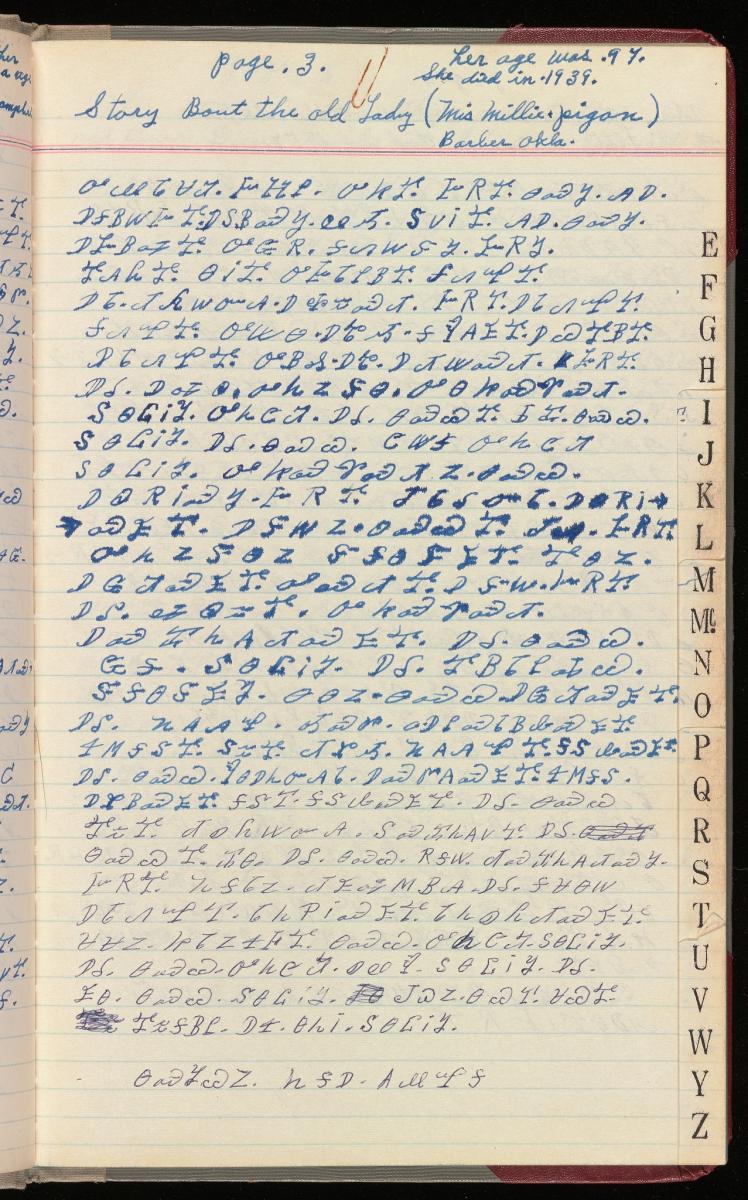 the Keetoowah Way. In the early 1820s, a man named Sequoyah developed a syllabary, a set of 86 written characters representing syllables used in the Cherokee language serving the purpose of an alphabet. The Cherokee syllabary was the first writing system ever developed and used by an indigenous nation in the United States. Texts using this method write in the "Keetoowah Way."
the Keetoowah Way. In the early 1820s, a man named Sequoyah developed a syllabary, a set of 86 written characters representing syllables used in the Cherokee language serving the purpose of an alphabet. The Cherokee syllabary was the first writing system ever developed and used by an indigenous nation in the United States. Texts using this method write in the "Keetoowah Way."
The Digital Archive for American Indian Languages Preservation and Perseverance (DAILP) is a community-based digital archive, based at Northeastern University, created to support indigenous peoples’ knowledge, interpretations, and representations of the past. Their selection of handwritten documents in the Cherokee syllabary are sourced from the Kilpatrick Collection at the Beinecke Rare Book and Manuscript Library of Yale University and the Newberry Library in Chicago. These manuscripts have been translated by Cherokee speakers and thoroughly annotated by teams of Northeastern students, Cherokee community members, and linguists. The DAILP was launched with support from the Institute for Museum and Library Services.
The NHPRC awarded Northeastern University a grant in support of its digital edition project, Cherokees Writing the Keetoowah Way. The project is creating an online environment for transcribing, translating, and contextualizing historical documents written using the Cherokee syllabary. The goals are to support language preservation, language learning, and language perseverance. All of the documents to be edited and published were written by Cherokee authors for Cherokee audiences, and reflect Cherokee perspectives.
You can read more about it at https://dailp.northeastern.edu/collections/cwkw
Digitizing Pittsburgh
In 1942, Works Progress Administration (WPA) workers in Pittsburgh discovered the first section of the 18th-century British Fort Pitt while digging on Liberty Avenue, near the intersection with Boulevard of the Allies. This was an exciting find, as the exact location of the fort had been lost for years. The excavation was part of a larger redevelopment plan of the Point that would see railyards and warehouses transformed into a park (albeit many years later). In this 1 942 drawing, the contours of Fort Pitt are overlaid on a contemporary map. You can also see the contours of the earlier French Fort Duquesne closer to the point at the confluence of the three rivers.
942 drawing, the contours of Fort Pitt are overlaid on a contemporary map. You can also see the contours of the earlier French Fort Duquesne closer to the point at the confluence of the three rivers.
A grant from the NHPRC went to support a two-year project to enhance discoverability and access to City of Pittsburgh archival collections, including City Council records, Board of Viewers’ case files, and City Planning Department records. The project arranged, described, and rehoused seven collections totaling approximately 750 cubic feet that document the period 1816 to 2006.
Now the Office of the City Clerk and City Council has launched a City Archives Digital Collections website, where extensive material from the archives will be made available to the public to browse and research online: https://pittsburgharchives.access.preservica.com/
Digital Readiness Toolkit Available
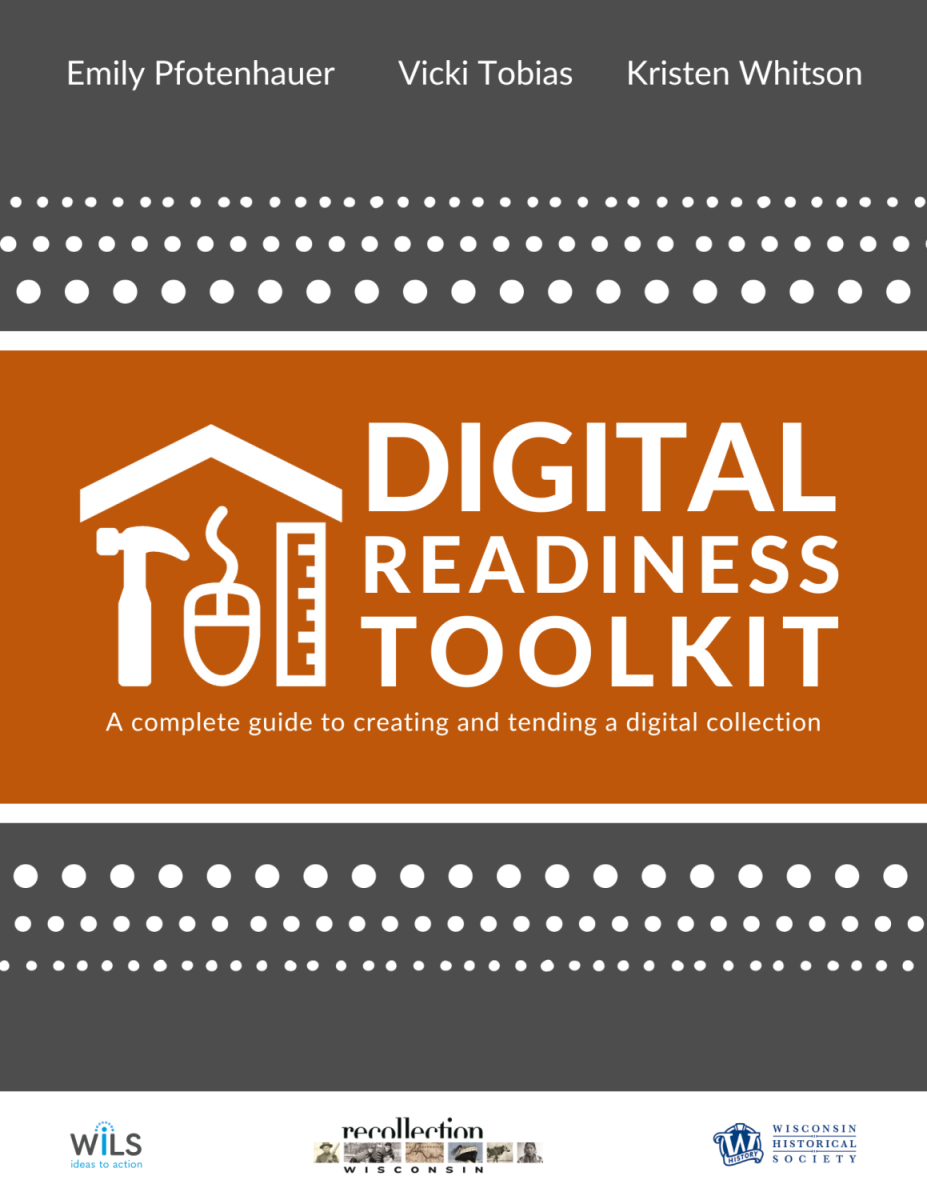 A few years ago, the NHPRC launched its Archives Collaboratives program designed to bring together multiple organizations to meet community needs in preserving and making accessible historical records collections. One such collaborative spent several years developing a toolkit to help historical records repositories with their digital strategies.
A few years ago, the NHPRC launched its Archives Collaboratives program designed to bring together multiple organizations to meet community needs in preserving and making accessible historical records collections. One such collaborative spent several years developing a toolkit to help historical records repositories with their digital strategies.
A partnership of the Community Archiving Workshop, Wisconsin Library Services and Recollection Wisconsin recently published a new version of its Digital Readiness Toolkit--a robust guide with resources for organizations and individuals creating and caring for digital collections of all kinds. You can access it at https://recollectionwisconsin.org/accessing-the-digital-readiness-toolkit
The Toolkit is free to all, and organizations can use the Audio Visual Digital Readiness Self Assessment to determine your priorities, use the Digital Project Planning Worksheet to develop a plan and budget, and mark your progress using the Digital Readiness Levels.
The Toolkit is a project of Wisconsin Library Services, Recollection Wisconsin, and the Wisconsin Historical Society. Expanded audiovisual resources in this version are developed by the Community Archiving Workshop in collaboration with twelve partners in geographically diverse regions of the US.
Jewish Labor and Political Archives
The NHPRC awarded a grant to the YIVO Institute to process and digitize three important collections from YIVO's Jewish Labor and Political Archives (JLPA) which documents Jewish political, labor, and social movements in the United States and Europe from 1870 to 1992.
The JLPA collections illustrate how the transnational activities of the Jewish working class were instrumental in the international labor movement.. These collections provide valuable insights on the role and impact of the Jewish immigrant community in American trade unions, labor organizations, political groups, and on American culture. They serve as a bridge to understanding the evolution and diversity of the American Jewish experience. The collections are:
- International Ladies’ Garment Workers’ Union Collection, 1894-1970s
- Amalgamated Clothing Workers of America Collection, 1914-1984
- Jewish Labor Committee Collection, 1930s-1960s
These three collections are part of a new eight-year, $8 million project to conserve, process, and digitize YIVO’s Jewish Labor and Political Archive (JLPA). The project will make these materials available online free-of-charge. The largest archival digitization project in YIVO’s history, the JLPA consists of approximately 3.5 million pages. For more on the project, go to https://summerprogram.yivo.org/JLPA-Release
Where are the Snows of Yesteryear?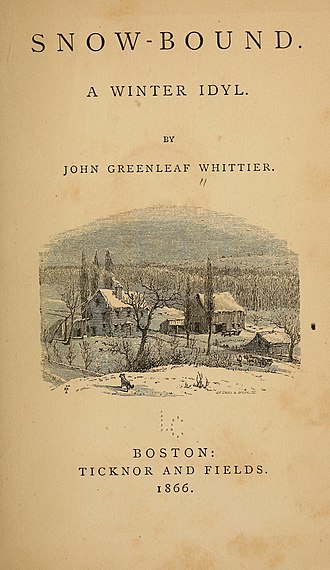
Minnesota, apparently. Secretly yearning to be tucked inside watching a growing snowstorm?
We offer you this smorgasbord from the archives of Minnesota Public Radio, digitized and made accessible through a grant from the NHPRC, that will take you back. Why, there's even a long excerpt from John Greenleaf Whittier's "Snow-Bound" and others, from Thanksgiving 1976. Surprisingly good at https://archive.mpr.org/.../11/25/thanksgiving-day-readings
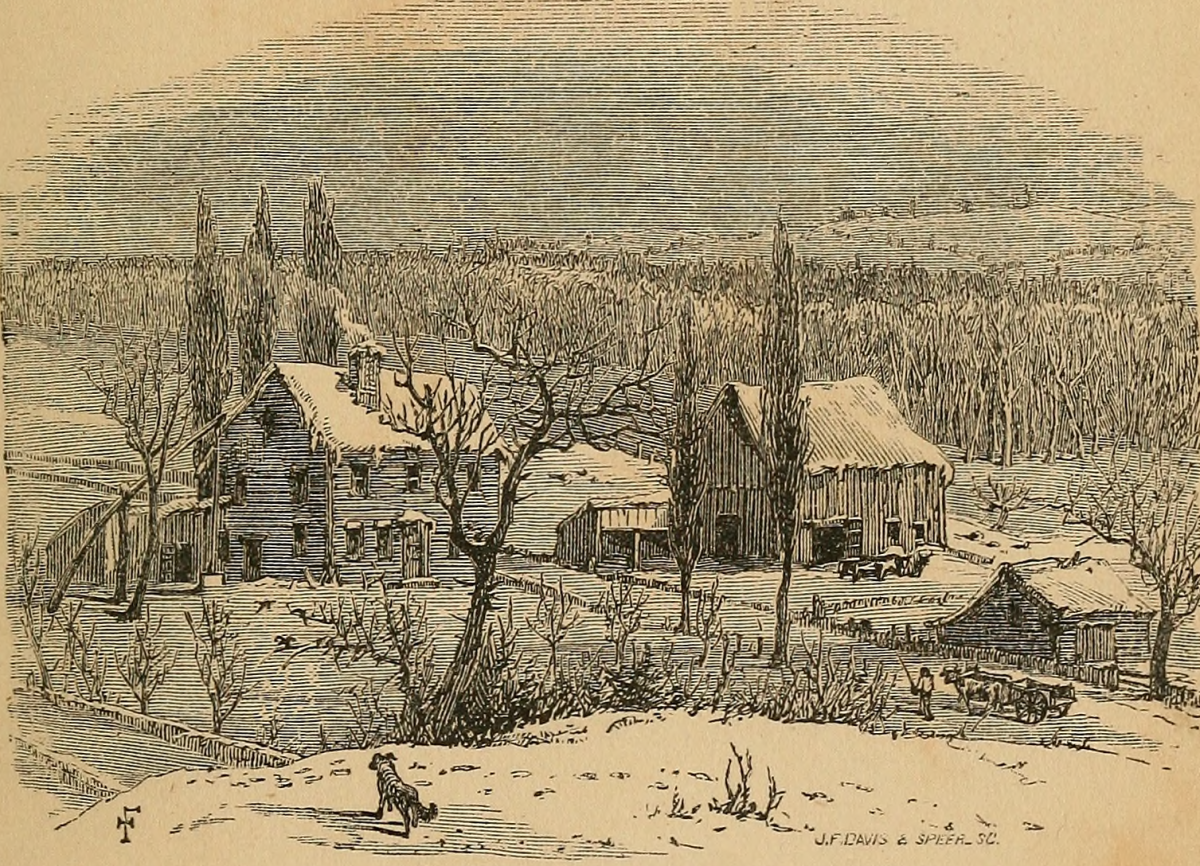
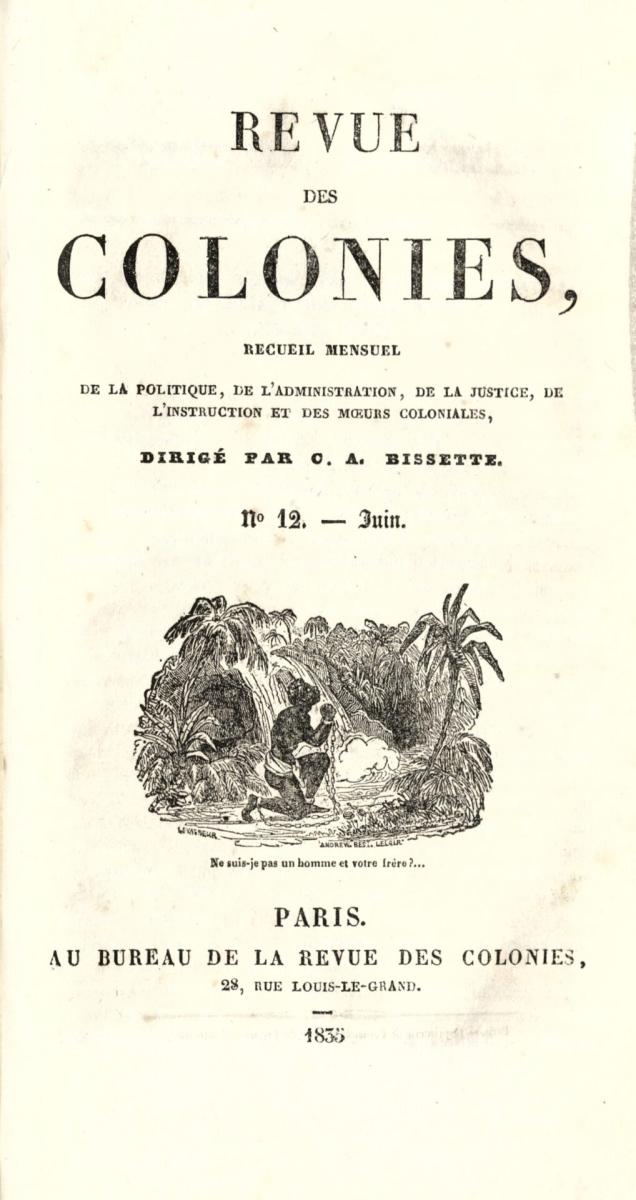
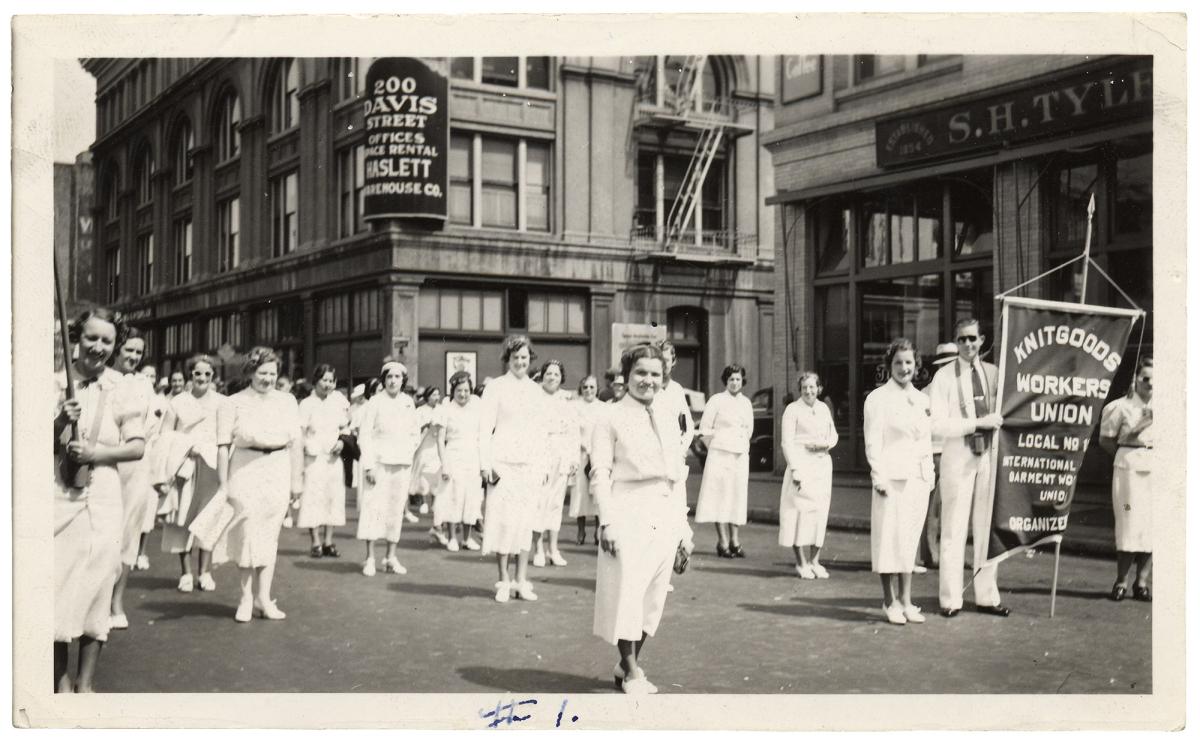
 Subscribe to our mailing list
Subscribe to our mailing list